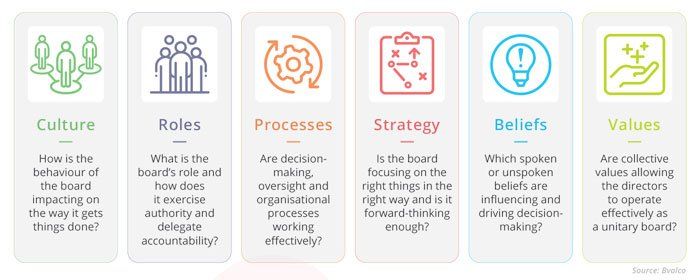Alison Gill is a behavioural psychologist, triple Olympian and the co-founder of Bvalco, a board evaluation consultancy focused on helping boards become fit for the future.
A pandemic review allows pause for thought, provides valuable learning and creates a good foundation for future decision-making.
As life starts to return to a socially distanced ‘new normal’, the coming weeks and months present the ideal time for boards to draw breath and reflect on their handling of the crisis.
Although some chairs might want to wait until we’re fully out the other side, or until their next board review is due, there are many benefits to reflecting on how the crisis was handled. Not least the opportunity to capture important information that might not be stored anywhere else, before this gets lost or stored in long-term memory with a negative or positive filter, depending on our personal views and experiences.
The ultimate aim of a crisis review is of course to capture and take forward useful learning and bring hidden anxieties and worries to the surface to better prepare for the future (or a much-dreaded second wave). So, here are three ways to conduct an effective pandemic review.
1. Conduct your review sooner rather than later
We all have a tendency to reformulate our experiences with a negative or positive filter, not to mention fall into attribution error, where we over-emphasise the importance of personal attributes, such as leadership style, ahead of situational factors, such as the need for specific health and safety measures.
All of which means that it’s important to reflect on events before our memories have time to forget the bits we don’t want to remember and over-emphasise the bits we do. A crisis review doesn’t need to be as involved as a full board review but it does need to capture how the response was handled, what can be learned from the approach and what the priorities are going forward.
The mere process of reflecting on events is an important mechanism to make sense of what happened so that those involved can be encouraged to store helpful information about what helped the business to run and what should be done differently, to store useful facts and shortcuts to these facts, instead of just our opinions.
2. Adhere to the principles of good corporate governance
During the crisis, many of the principles of good corporate governance have been impacted. Strategy might have had to have been recreated on the go, as organisations sought to transform business models. Non-executive directors probably had to roll up their sleeves and get stuck-in in a way that was necessary, but might now be compromising their ability to take a step back to challenge the executive.
The make-up of most boards has changed, as demand for people with technology and HR capability increased. Relationships with all stakeholders, especially employees, have evolved. The culture, beliefs and values of the company and its people will have all been transformed by recent events, as well as by the response of leaders, whether the board was proactively seeking to do this or not.
A Bvalco crisis response will look at each of the following areas in turn and how well directors were able to proactively control them as opposed to having them evolve unguided. The aim is to create succinct yet insightful recommendations for how to proactively manage these areas now and in the event of a future crisis.

3. Use an independent facilitator
A facilitated pandemic review allows all board members to contribute equally and the chair, who would otherwise have to facilitate, to share their valuable point of view.
Independent reviewers can also ask challenging questions to draw out what matters and prompt, summarise and reflect in an objective way to highlight the significance of what’s being shared.
It also allows individual directors to bring hidden worries to the surface and will look at the health and resilience of the board to create a positive time of reflection, draw a line under what’s already gone before and pull out useful learning points and recommendations for the future.
Ultimately, a good crisis review, whether an interim light-touch review or more in-depth deep dive, will give everyone pause for breath and an invaluable opportunity to learn from what’s gone before.
Transparency and humility have been essential leadership traits during this crisis, and research by Cranfield University has also shown them to have a positive impact on share price and the ability of companies to weather past crises.
How has your board performed during the pandemic?
If you would like to find out how well your board managed oversight of the crisis, an externally facilitated board review can provide the reflection time needed to maximise learning and prepare for further uncertainty. Find out how we can help you pose the right questions to draw out deep, yet actionable, insights.
Share this article on LinkedIn!




